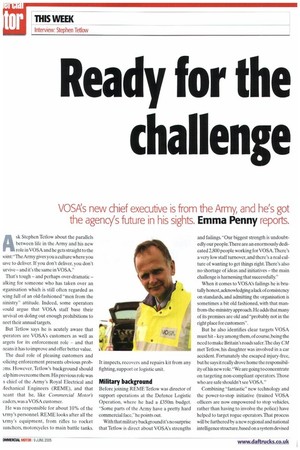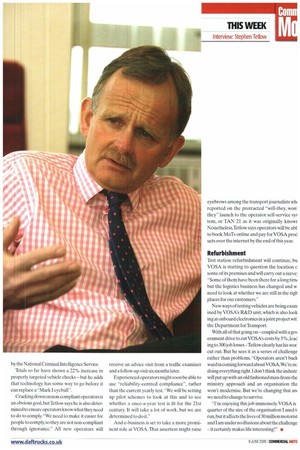Ready for the challenge
Page 24

Page 25

If you've noticed an error in this article please click here to report it so we can fix it.
VOSA's new chief executive is from the Army, and he's got
the agenc-y's future in his sights. Emma Penny reports.
Ask Stephen Tetlow about the parallels between life in the Army and his new role in VOSA and he gets straight to the Point:"The Army gives you a culture where you Lave to deliver. If you don't deliver, you don't urvive — and it's the same in VOSA."
That's tough — and perhaps over-dramatic — alking for someone who has taken over an irganisation which is still often regarded as icing full of an old-fashioned "men from the ainistry" attitude. Indeed, some operators vould argue that VOSA staff base their urvival on doling out enough prohibitions to neet their annual targets.
But Tetlow says he is acutely aware that Iperators are VOSA's customers as well as argets for its enforcement role — and that neans it has to improve and offer better value. The dual role of pleasing customers and lolicing enforcement presents obvious probNils. However, Tetlow's background should Lelp him overcome them. His previous role was s chief of the Army's Royal Electrical and 4echanical Engineers (REME), and that leant that he, like Commercial Motor's eaders, was a VOSA customer.
He was responsible for about 10% of the larny's personnel. REME looks after all the lirmy's equipment, from rifles to rocket lunchers, motorcycles to main battle tanks. It inspects, recovers and repairs kit from any fighting, support or logistic unit.
Military background
Before joining REME Tetlow was director of support operations at the Defence Logistic Operation, where he had a 1350m budget. "Some parts of the Army have a pretty hard commercial face," he points out.
With that military background it's no surprise that Tetlow is direct about VOSA's strengths and failings. "Our biggest strength is undoubtedly our people.There are an enormously dedicated 2,800 people working for VOSA.There's a very low staff turnover, and there's a real culture of wanting to get things right. There's also no shortage of ideas and initiatives — the main challenge is harnessing that successfully."
When it comes to VOSA's failings he is brutally honest, acknowledging a lack of consistency on standards, and admitting the organisation is sometimes a bit old fashioned, with that manfrom-the-ministry approach.He adds that many of its premises are old and "probably not in the right place for customers".
But he also identifies clear targets VOSA must hit — key among them, of course, being the need to make Britain's roads safer, The day CM met Tetlow, his daughter was involved in a car accident. Fortunately she escaped injury-free, but he says it really drove home the responsibility of his new role."We are going to concentrate on targeting non-compliant operators. Those who are safe shouldn't see VOSA."
Combining "fantastic" new technology and the power-to-stop initiative (trained VOSA officers are now empowered to stop vehicles, rather than having to involve the police) have helped to target rogue operators. That process will be furthered by a new regional and national intelligence structure, based on a system devised by the National Criminal Intelligence Service.
Trials so far have shown a 22% increase in properly targeted vehicle checks — but he adds that technology has some way to go before it can replace a "Mark I eyeball".
Cracking down on non-compliant operators is an obvious goal, but Tetlow says he is also determined to ensure operators know what they need to do to comply. "We need to make it easier for people to comply,so they are not non-compliant through ignorance." All new operators will receive an advice visit from a traffic examiner and a follow-up visit six months later.
Experienced operators might soon be able to use "reliability-centred compliance", rather than the current yearly test. "We will be setting up pilot schemes to look at this and to see whether a once-a-year test is fit for the 21st century. It will take a lot of work, but we are determined to do it."
And e-business is set to take a more prominent role at VOSA. That assertion might raise eyebrows among the transport journalists wh. reported on the protracted "will-they, won' they" launch to the operator self-service sys tern, or TAN 21 as it was originally know' Nonetheless,Tetlow says operators will be abl to book MoTs online and pay for VOSA prod ucts over the internet by the end of this year.
Refurbishment Test station refurbishment will continue, bu VOSA is starting to question the location c some of its premises and will carry out a suirve; "Some of them have been there for a long tim( but the logistics business has changed and w need to look at whether we are still in the righ places for our customers."
New ways of testing vehicles are being exam ined by VOSA's R&D unit, which is also look ing at onboard electronics in a joint project wit the Department for Transport.
With all of that going on — coupled with a go‘ ernment drive to cut VOSA's costs by 5%, lead ing to 300 job losses —Tetlow clearly has his wor cut out. But he sees it as a series of challenge rather than problems. "Operators aren't back ward in coming forward about VOSA. We're nc doing everything right. I don't think the industr will put up with an old fashioned man-from-the ministry approach and an organisation tha won't modernise. But we're changing that an we need to change to survive.
"I'm enjoying this job immensely. VOSA is quarter of the size of the organisation I used t. run, but it affects the lives of 30 million motorist and! am under no illusions about the challenge — it certainly makes life interesting!" •






































































































































































































